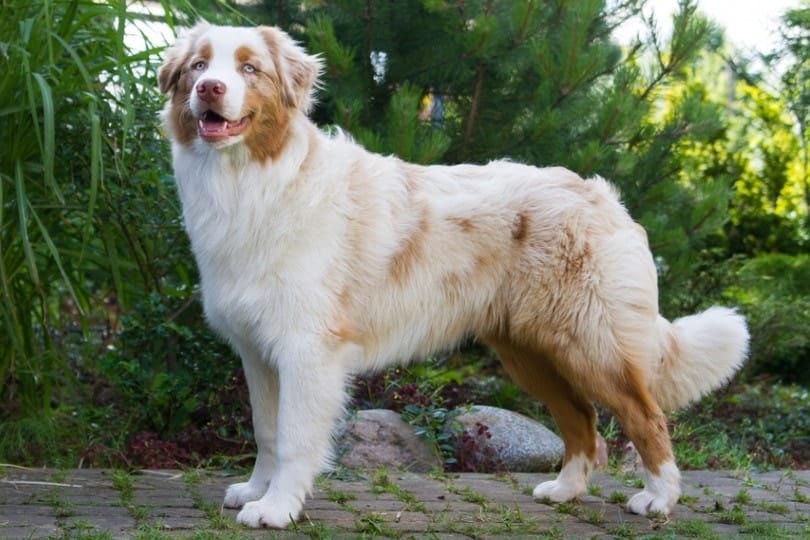According to the Centers for Disease Control and Prevention1 (CDC), roughly 61 million American adults have a disability. However, there are only about 500,000 service animals2 assisting individuals with mobility, vision, hearing, or other issues impacting their quality of life. Australian Shepherds are one of the most popular breeds in the country, ranking 12th with the American Kennel Club3 (AKC).
The qualification of whether one dog is a better service animal for an individual is undoubtedly a personal one. However, the Australian Shepherd has all the earmarks of making an excellent choice. However, some caveats exist that you should know upfront if this breed is on your shortlist.
Definition of a Service Dog
Let’s begin with the definition of a service dog to see how the Australian Shepherd fits into this role. The ADA National Network doesn’t put a breed limitation on it. Instead, the framework describes this animal as “…any dog that is individually trained to do work or perform tasks for the benefit of an individual with a disability, including a physical, sensory, psychiatric, intellectual, or other mental disability.”
It’s worth noting that many service dogs are also some of the AKC’s most popular breeds. According to US Service Animals, the ones registered the most with the organization include:
- Golden Retriever
- Labrador Retriever
- Bernese Mountain Dog
- Boxer
- Poodle
- German Shepherd
- Border Collie
The inclusion of the last breed is an interesting one since the pup has many of the same qualities you’d see in the Australian Shepherd. Both are herding dogs.

Desirable Traits of a Service Dog
Intelligence and a calm demeanor stand out as desirable traits of a service dog. This animal companion must support its charge, sometimes making decisions for the individual. Compassion is beneficial in caregivers. It also comes into play with a service animal. Other qualities that make a good choice include:
- Eager to please
- Trainable
- Friendly
- Loyal
- Reliable
- Hard-working
Of course, the chemistry between the owner and the dog must click. After all, trust is the foundation of this relationship. A disabled individual must be able to rely on their service animal, with many also providing valuable emotional support.

How the Australian Shepherd Stacks Up in This Role
The official breed standard offers some interesting insights into the Australian Shepherd’s ability to step in as a service animal. It includes many desirable traits, such as being good-natured, attentive, loyal, and intelligent. The breed competes in several events, including obedience and agility. These competitive events speak to its capacity to succeed as a service dog.
AKC also cites the breed’s work-oriented personality. The Australian Shepherd needs a job. That’s been its purpose since Basque sheepherders selectively bred the dog in the 1800s. Taking care of a disabled individual would seem an excellent fit for this pup. It’s also an active breed that would probably enjoy staying on the job as long as it takes.
The Australian Shepherd’s high energy is the proverbial double-edged sword. The dog will keep up with the demands of its role. However, this pup wants work and something to do. Let’s revisit the ADA’s definition of a service animal. You’ll notice that it specifies an animal that is individually trained. That tells us the selection of the dog and its personality is part of the mix.
All dogs require some work. The Australian Shepherd has a double coat. Regular grooming is necessary to keep this pup matt-free. It can also help cut down on hair from shedding. It’s something to keep in mind when pairing the right dog with the service-animal situation.
Wrapping Up
The Australian Shepherd is a popular breed for a good reason. It has a lovable personality with the intelligence and loyalty to put it to the head of the pack for a choice of a good service dog. Its high energy is the only variable that could make it an inappropriate pick. Otherwise, an individual can feel confident that this pup will give its job all it can take—and then some.
Featured Image Credit: Christian Mueller, Shutterstock














